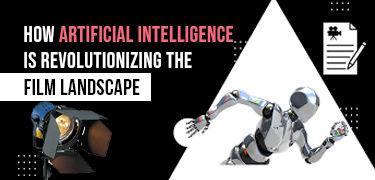How Artificial Intelligence is Revolutionizing the Film Landscape
There is a new era of filmmaking in which artificial intelligence (AI) takes center stage, changing how we create and watch films. As technology improves, AI has emerged as a severe disruptor, affecting every aspect of the film industry. AI transforms storytelling, visual effects, and audience involvement from pre-production to post-production in ways we never anticipated. In this blog post, we'll look at how AI alters the film industry, leaving us in awe of its boundless possibilities.


The Future of AI-Powered Video Editing Transforms Filmmaking
AI-powered video editing represents a paradigm shift in filmmaking, offering unprecedented efficiency, precision, and creative flexibility. AI systems can analyze enormous amounts of data, identify trends, and automate repetitive tasks, speeding up the editing process and allowing filmmakers to focus on the story.
Streamlining AI Automation For Film And TV Producers
Film and TV Producers are continually looking for methods to improve production workflows and reduce time to market. AI-powered automation technologies provide a solution by automatically handling activities like film organization, color correction, and audio synchronization. By using AI automation's potential, producers may speed up the editing process, eliminate manual labor, and quickly fulfill tight production schedules.
Audience Insights:
AI algorithms are proficient at analyzing visual and aural clues in video footage, allowing for enhanced content analysis and insight development. Film and television producers may use AI techniques to obtain important audience information, spot trends, and optimize material for maximum effect. Whether improving story frameworks or personalizing material to specific audiences, AI-powered analytics enable producers to make data-driven choices throughout production.
AI-Powered Editing Platforms for Filmmakers
The introduction of AI-powered collaborative editing systems has revolutionized how filmmakers cooperate and communicate. AI-powered editing solutions, which include cloud storage, real-time collaboration, and version control, enable seamless collaborative and distant editing processes. Film and television producers may manage projects from anywhere worldwide, encouraging cooperation between geographically scattered teams and expediting production procedures.
AI-Driven Recommendations for Filmmakers
AI algorithms may analyze user preferences, viewing behaviors, and engagement data to provide personalized editing recommendations based on individual filmmaker needs. AI-powered recommendation engines recognize each producer's style and objectives and recommend applicable editing approaches, transitions, and effects, allowing filmmakers to accomplish their artistic vision accurately and efficiently.
AI for Marketing and Distribution
AI-powered analytics solutions have transformed marketing and distribution methods in the film business. Companies like Movio utilize artificial intelligence to analyze massive volumes of audience data, delivering significant insights into viewer preferences and behaviors. AI allows us to analyze audience segmentation, forecast movie preferences, and focus marketing activities, resulting in increased audience engagement and box office success.
AI-enhanced editing and Sound Design
AI has simplified post-production operations, such as video editing and sound design. For example, Adobe Sensei, an AI-powered tool, automates video editing tasks such as scene identification, increasing editing efficiency. AI software for sound design, such as iZotope's RX, can autonomously reduce background noise and improve audio quality with minimum operator interaction.
The film "The Social Network" used AI-powered software to eliminate shadows and reflections from the actors' faces during post-production, resulting in a visually seamless finished product.
Here are some other ways to benefit from AI and sites to explore:
AI-Assisted Editing:
Platforms such as Adobe Premiere Pro and Final Cut Pro X use AI-powered capabilities to improve editing workflows, such as auto-editing, scene analysis, and automatic color grading.
Visual Effects and CGI:
AI solutions like NVIDIA Omniverse and Autodesk Maya employ machine learning to automate and enhance visual effects development, compositing, and realistic CGI rendering.
Storytelling and scriptwriting:
AI technologies such as ScriptBook and Soothsayer analyze screenplays, forecast audience involvement, and give insights to help improve storytelling and script development.
Content Recommendation:
Platforms like Netflix and YouTube use AI algorithms to offer personalized content based on user tastes, allowing filmmakers to reach their target audience successfully.
Research & Development:
Websites like Arxiv.org, Towards Data Science, and AI Hub offer research papers, articles, and resources on AI breakthroughs in filmmaking, keeping you up to speed and educated.
Future of AI in Film Industry:
Implementing AI in the film business has enormous promise for the future. As AI models progress, they supplement creative processes, spark new ideas, and push the frontiers of narrative. AI may help filmmakers optimize numerous production parts, including screenplay analysis, casting recommendations, and audience reaction. While artificial intelligence cannot replace human creativity, it is an effective tool for improving and accelerating filmmaking.


CATEGORIES
- MBA Program
- Data Science and Analytics
- Cloud Computing
- Data Analytics and Business Intelligence
- AI and Digital Systems
- Cyber Security and Digital Forensics
- Business Analytics & Intelligence
- Banking & Financial Services
- International Business
- Digital Marketing
- Research Paper
- Media & Entertainment
- Media Management
- Journalism and Media Production
- Media & Information Technology
- Visual Communication
- Game Development
- Sound Engineering
- Game Art & Design
- Photography
- Film Making
- Animation & VFX
Are you aspiring to become a proficient Film Making professional?
Look no further; we are committed to nurturing the potential of young minds. Are you ready to enhance your skills?


